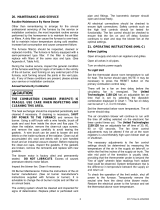
function properly. The draft regulator, when installed
should be in the same room or enclosure as the furnace
and should not interfere with the combustion air supplied
to the burner. The control should also be located near
the furnace flue outlet and installed according to the
instructions supplied with the regulator. The flue outlet
pressure (measured between the furnace and draft
regulator, or the oil burner mounting plate over-fired draft
access port. fig. 2) should be set to -0.02 in. w.c.
8. OPTIONAL SIDE WALL VENTING
O4HD-091A-14-FA-DV furnace models are
manufactured to be installed as sidewall vented units.
Please refer to Direct Venting Instructions, P/N
240006979 included with the Vent Kit for details. Sidewall
Venting (Direct Venting) requires the use of a specific oil
burner; the Beckett AFII. Please refer to Appendix A,
Table A2.
Note: Sidewall venting requires special attention to
combustion air supply. There is no natural draft in the
venting system between furnace cycles; therefore, if the
indoor pressure is negative relative to the outdoors, the
vent terminal becomes a point of infiltration. This could
lead to oil odour control problems. This problem is
rectified by the use of ducted outdoor air for combustion
(semi-sealed combustion), using the Beckett AFII oil
burner. See Direct Vent Instructions supplied with the
Vent Kits.
9a. FAN TIMER BOARD AND LIMIT CONTROL
(FIG. 4) (page 22)
The Electronic Fan Timer integrates control of all burner
and circulator fan operations. This control is the central
wiring point for most of the electrical components in the
furnace. The United Technologies 1158-120 (O4HD-
091A-12-FB and O4HD-091A-14-FA-DV) has an
adjustable fan on time that is set by selecting the
dipswitch combination displayed in Chart 1. This fan on
delay can be set at 1, 2, 4 or 6 minutes. This provides a
delay between the burner ignition and blower start-up to
eliminate excessive flow of cold air when the blower
comes on. The United Technologies 1158-120 (O4HD-
091A-12-FB and O4HD-091A-14-FA-DV) has an
adjustable fan off time of 30, 60, 90 or 120 seconds
displayed in Chart 1. The fan off delay time starts when
the burner motor is de-energized at the end of a call for
heat. Blower shutdown is delayed to remove any residual
heat from the heat exchanger and improve the annual
efficiency of the furnace.
The electronic fan timer board works in conjunction with
snap disc limit controls, which perform a safety function,
and breaks power to the oil burner primary control, which
shuts off the burner if the furnace over-heats. The limit
control is thermally operated and automatically resets.
The limit control is factory installed, pre-set and is not
adjustable.
If the limit control opens with the United
Technologies 1158-120 (O4HD-091A-12-FB and
O4HD-091A-14-FA-DV) electronic fan control, the
circulating fan will be energized as well. When the
limit closes, the fan off timer will begin. At the end of
the fan off time cycle the burner will be energized,
initiating a normal burner cycle.
CHART 1
United Technologies 1158-120 (O4HD-091A-
12-FB and O4HD-091A-14-FA-DV)
Dip Switch Position Blower Delay Times
1 2 3 4 On
Seconds
Off
Minutes
Off Off 30
On Off 60
Off On 90
On On 120
Off Off 1
On Off 2
Off On 4
On On 6
9b. FAN TIMER BOARD AND LIMIT
CONTROL (FIG. 5) (page 22)
The United Technologies 1168-1 ECM (O4HD-
091A-V-FA) tap board has an adjustable fan on/off
delay that must be adjusted in accordance with the
furnace input rating (nozzle size). Refer to Table A-
10 (pg 15) for ECM blower set-up.
10. ELECTRICAL CONNECTIONS
The furnace is listed by the Canadian Standards
Association under the NRTL (North American)
Standard. It is factory wired and requires minimal
field wiring. All field wiring should conform to
CAN/CSA C22.1 Canadian Electrical Code, Part 1,
and by local codes, where they prevail. In the United
States, the wiring must be in accordance with the
National Fire Protection Association NFPA-70,
National Electrical Code, and with local codes and
regulations.
The furnace should be wired to a separate and
dedicated circuit in the main electrical panel;
however, accessory equipment such as electronic
air cleaners and humidifiers may be included on the
furnace circuit. Although a suitably located circuit
breaker can be used as a service switch, a separate
service switch is advisable. The service switch is
necessary if reaching the circuit breaker involves
becoming close to the furnace, or if the furnace is
located between the circuit breaker and the means
of entry to the furnace room. The furnace switch
5




















